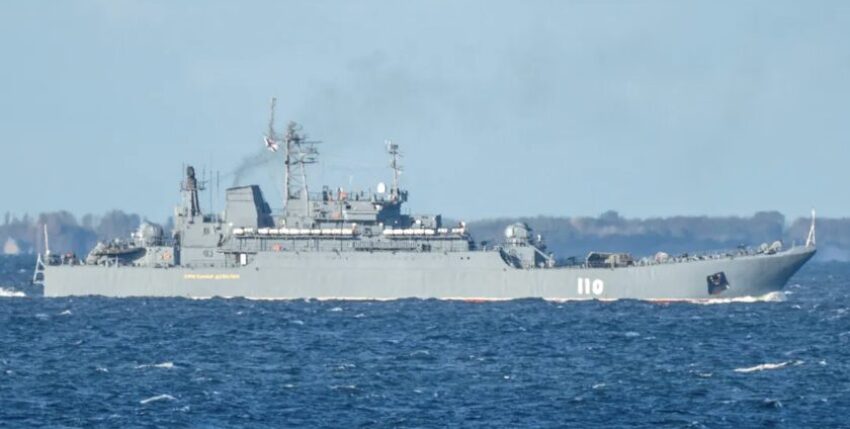What next for Russia's naval units in Syria? Wait and see, evacuate or hold out. Support from a landing ship?
Michael Nitz and Hans Uwe Mergener
In the midst of uncertainty about the intentions of Russian naval units in the eastern Mediterranean, a ship movement in the Baltic Sea and its approaches draws attention. At around 14:00 on 10 December 2024, the Ropucha class landing ship "Aleksandr Shabalin", hull number 110, passed the bridge over the Great Belt on a northerly course. At present, the pending questions remain unanswered: Is she on her way to the Mediterranean? With what objective - geographically and operationally? In view of its history, the landing ship was at least temporarily assigned to the Russian Mediterranean fleet in November 2014, the "Aleksandr Shabalin" could return there.
In autumn 2023, she was observed returning to the Baltic to, according to Russian sources, go to Kronstadt for a maintenance stay. She began training operations in the summer. TASS reported on the ship's artillery and landing exercises on 7 and 13 August 2024. In September, the "Aleksandr Shabalin" took part in the major manoeuvre Okean 2024, which lasted several weeks.
The situation of the Russian navy in and around Syria remains unclear and complex. Despite official reports of a partial evacuation of the naval base in Tartus, experts' analyses of publicly available information on internet platforms and current satellite images indicate that several Russian ships are still present in the region. They are anchored north-west of Tartus. Four ships could be identified on the commercial satellite images: the Admiral Gorshkov class guided missile frigate "Admiral Golovko", another guided missile frigate "Admiral Grigorovich", type ship of the same class, a submarine of the modified Kilo class "Novorossiysk" and a tanker, presumably the "Vyazma", an auxiliary ship of the Kaliningradneft class. The frigate "Admiral Gorshkov", which was also stationed in Tartus until the recent events, and the Altay-class auxiliary vessel "Yelnya" could not be identified. Observers assume that the two could leave the Mediterranean and return to their Northern Fleet home.
The "Admiral Gorshkov" and "Admiral Grigorovich" class frigates are among the most modern surface ships in the Russian fleet. Both are capable of deploying the long-range land attack missile Kalibr and the hypersonic anti-ship missile Zirkon.
Importance of a military base in the Mediterranean for Moscow
Furthermore, according to analyst A. Masiello, commercial satellite imagery from 10 December shows that the Russian naval base in Tartus is not completely empty. Three Russian ships, including a Project 21980 or Grachonok-class unit and two Project 03160 Raptor-class high-speed coastal patrol boats, are still believed to be there. Masiello concludes that the Tartus naval base would remain in Russian hands even in the event of an evacuation.
Analysts generally agree that the naval base in Tartus remains of strategic importance for Russia. To date, it is the only naval base outside the Russian mainland. As with the Hmeimim military airbase, Moscow could project its forces into the Mediterranean from here and protect its geopolitical interests in the region.
Experts such as the Austrian military historian Colonel Markus Reisner and the British political scientist Mark Galeotti emphasise the strategic importance of the Russian bases in Syria. They believe that Russia will try to reach agreements with the new rulers in Syria in order to secure its military presence in the region.
Should the attempts to come to terms with the new Syrian regime fail, Moscow will endeavour to find other ways to secure and expand its military presence in the region. A base in the Mediterranean not only secures Russia access to resources, but also a position of influence in North Africa and beyond.
As far as the landing ship "Aleksandr Shabalin" is concerned, it could play a role in the endeavour to secure a 'footprint', assuming it sails the Mediterranean. In addition to its possible logistical support for the remaining ships, the reloading or transport of material to another harbour is also conceivable. International experts like to refer to Libya and Algeria in connection with the Russian base issue in the Mediterranean. Moscow has traditionally maintained friendly relations with Algiers. In recent years, Russia has expanded its military presence and influence in Libya. Moscow mainly supports General Khalifa Haftar and his Libyan National Army (LNA), which operates in the east of the country.









